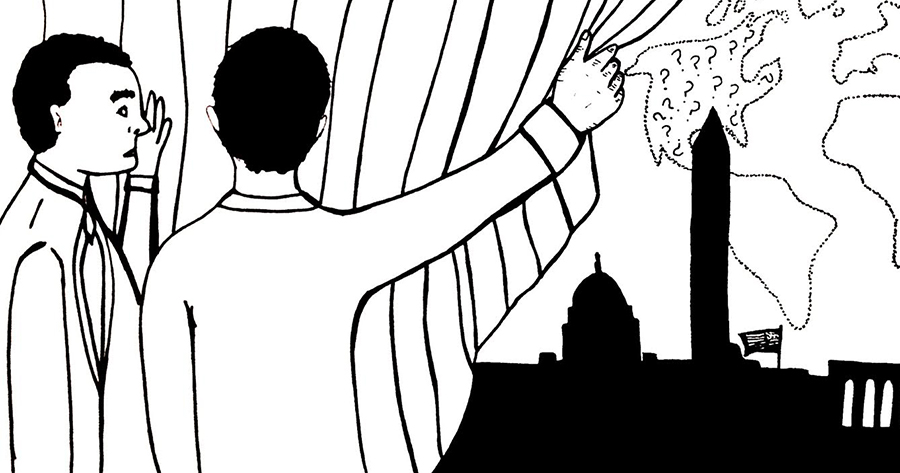“Chickensh-t-Gate” highlights need for more U.S. leadership
The thing about Bibi is, he’s a chickensh-t.”
These were the words The Atlantic’s Jeffrey Goldberg attributed to an anonymous senior Obama administration official, made in reference to Israeli Prime Minister Benjamin Netanyahu, often called Bibi. This inflammatory statement triggered strong reactions from both U.S. and Israeli officials, with many dubbing the incident “Chickensh-t-Gate.”
“The good thing about Netanyahu is that he’s scared to launch wars,” the official was quoted as saying in Goldberg’s Oct. 28 column. “The bad thing about him is that he won’t do anything to reach an accommodation with the Palestinians or with the Sunni Arab states. The only thing he’s interested in is protecting himself from political defeat … He’s got no guts.”
Though the controversy sparked from Goldberg’s revelation was problematic (and admittedly humorous), it is indicative of a much greater problem than simple name-calling — a trend of perpetual Israeli intransigence and the U.S. leadership’s failure to tell Netanyahu exactly what it thinks.
In fact, this isn’t the first time that top U.S. officials have been caught bashing Netanyahu. In 2011, then-Secretary of Defense Robert Gates called Netanyahu an “ungrateful ally.” After his first meeting with Netanyahu in 1996, then-President Bill Clinton reportedly said, “Who the f-ck does he think he is? Who’s the f-cking superpower here?” When then-French President Nicolas Sarkozy vented to President Barack Obama about his disdain for the Israeli prime minister, Obama was reported to have responded by saying, “You are fed up with him, but I have to deal with him even more often than you do.”
The White House was quick to distance itself from this most recent round of comments, characterizing them as inappropriate and counterproductive. Though the response is right in that such comments are not indicative of how one would expect allies to interact, it fails to acknowledge that being a serious ally means much more than refraining from embarrassing name-calling — it also means having respect for one another.
It means that Netanyahu shouldn’t be firing back against U.S. opposition to new settlement blocs in East Jerusalem by telling President Obama that his views are “un-American.” It means not continually and unapologetically undermining U.S. efforts to broker peace talks by issuing damaging settlement tenders on occupied territory. It means not ignoring the United States’ foreign policy goal of achieving a two-state solution based on 1967 borders by openly emphasizing your opposition to such an agreement ever occurring.
Netanyahu’s disdain for U.S. policy and leadership is nothing new — yet it has time and again been met with American silence, inaction and, at most, bitter and anonymous name-calling. Even in the face of Netanyahu’s decision to illegally annex approximately 1,000 acres of Palestinian land — the largest West Bank land grab of its kind in more than 30 years — American leaders offered nothing more than minor rebuke.
Though U.S. frustration with Netanyahu is certainly justified, such actions warrant more than childish name-calling. As a strong ally who supports Israel both militarily and financially to the tune of $3.1 billion per year, the United States has both a duty and an obligation to keep its alliance in check. This means meeting Netanyahu’s defiance with more than toothless condemnation — it means finally telling Netanyahu exactly what the United States thinks.
Yasmeen Serhan is a junior majoring in international relations. She is also the special projects editor of the Daily Trojan. “Point/Counterpoint” runs Tuesdays.



This is Israel’s real problem:
As long as the Muslim population remains around 1% of any given country they
will be regarded as a peace-loving minority and not as a threat to anyone. In
fact, they may be featured in articles and films, stereotyped for their
colorful uniqueness:
United States — Muslim 1.0%
Australia — Muslim 1.5%
Canada — Muslim 1.9%
China — Muslim 1%-2%
Italy — Muslim 1.5%
Norway — Muslim 1.8%
At 2% and 3% they begin to proselytize from other ethnic minorities and
disaffected groups with major recruiting from the jails and among street gangs:
Denmark — Muslim 2%
Germany — Muslim 3.7%
United Kingdom — Muslim 2.7%
Spain — Muslim 4%
Thailand — Muslim 4.6%
From 5% on they exercise an inordinate influence in proportion to their
percentage of the population. They will push for the introduction of halal
(clean by Islamic standards) food, thereby securing food preparation jobs for
Muslims. They will increase pressure on supermarket chains to feature it on
their shelves — along with threats for failure to comply.
France — Muslim 8%
Philippines — Muslim 5%
Sweden — Muslim 5%
Switzerland — Muslim 4.3%
The Netherlands — Muslim 5.5%
Trinidad & Tobago — Muslim 5.8%
At this point, they will work to get the ruling government to allow them to
rule themselves under Sharia, the Islamic Law. The ultimate goal of Islam is
not to convert the world but to establish Sharia law over the entire world.
When Muslims reach 10% of the population, they will increase lawlessness as
a means of complaint about their conditions (Paris — car burnings, etc.). Any
non-Muslim action that offends Islam will result in uprisings and threats
(Amsterdam — Mohammed cartoons).
Guyana — Muslim 10%
India — Muslim 13.4%
Israel — Muslim 16%
Kenya — Muslim 10%
Russia — Muslim 10-15%
After reaching 20% expect hair-trigger rioting, jihad militia formations,
sporadic killings and church and synagogue burning:
Ethiopia — Muslim 32.8%
At 40% you will find widespread massacres, chronic terror attacks and ongoing
militia warfare:
Bosnia — Muslim 40%
Chad — Muslim 53.1%
Lebanon — Muslim 59.7%
From 60% you may expect unfettered persecution of non-believers and other
religions, sporadic ethnic cleansing (genocide), use of Sharia Law as a weapon
and Jizya, the tax placed on infidels:
Albania — Muslim 70%
Malaysia — Muslim 60.4%
Qatar — Muslim 77.5%
Sudan — Muslim 70%
After 80% expect State run ethnic cleansing and genocide:
Bangladesh — Muslim 83%
Egypt — Muslim 90%
Gaza — Muslim 98.7%
Indonesia — Muslim 86.1%
Iran — Muslim 98%
Iraq — Muslim 97%
Jordan — Muslim 92%
Morocco — Muslim 98.7%
Pakistan — Muslim 97%
Syria — Muslim 90%
Tajikistan — Muslim 90%
Turkey — Muslim 99.8%
United Arab Emirates — Muslim 96%
100% will usher in the peace of “Dar-es-Salaam” — the Islamic House of Peace
— there’s supposed to be peace because everybody is a Muslim:
Afghanistan — Muslim 100%
Saudi Arabia — Muslim 100%
Somalia — Muslim 100%
Yemen — Muslim 99.9%
Of course, that’s not the case. To satisfy their blood lust, Muslims then
start killing each other for a variety of reasons.